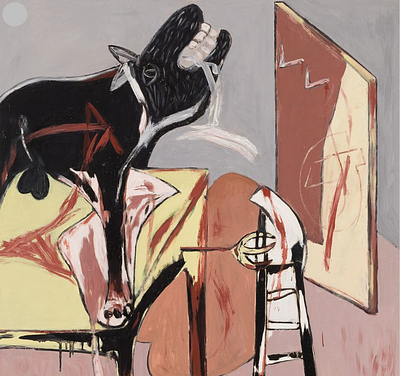JOAQUÍN VAQUERO PALACIOS (Oviedo, 1900 - Madrid, 1998). "Burnt stubble". Oil on canvas.
Lot 69
About Seller
Setdart Auction House
Carrer Aragó 346
Barcelona
Spain
Setdart Subastas was born in 2004 and is currently the first online art auction in Spain with solidity, prestige and reliability guaranteed by our more than 60,000 users. Setdart has a young, dynamic and enterprising team ready to successfully manage the purchase and sale of art works through custom...Read more
Estimate:
EUR€7,000 - EUR€8,000
$7,216.49 - $8,247.42
Absentee vs Live bid
Two ways to bid:
- Leave a max absentee bid and the platform will bid on your behalf up to your maximum bid during the live auction.
- Bid live during the auction and your bids will be submitted real-time to the auctioneer.
Bid Increments
| Price | Bid Increment |
|---|---|
| EUR€0 | EUR€10 |
| EUR€200 | EUR€25 |
| EUR€500 | EUR€50 |
| EUR€1,000 | EUR€100 |
| EUR€3,000 | EUR€200 |
| EUR€5,000 | EUR€500 |
| EUR€10,000 | EUR€1,000 |
| EUR€20,000 | EUR€2,000 |
| EUR€50,000 | EUR€5,000 |
About Auction
By Setdart Auction House
Nov 16, 2021
Set Reminder
2021-11-16 08:00:00
2021-11-16 08:00:00
America/New_York
Bidsquare
Bidsquare : Contemporary and Actual Art
https://www.bidsquare.com/auctions/setdart-auction-house/contemporary-and-actual-art-7839
Setdart Auction House sofia@setdart.com
Setdart Auction House sofia@setdart.com
- Lot Description
JOAQUÍN VAQUERO PALACIOS (Oviedo, 1900 - Madrid, 1998). "Burnt stubble". Oil on canvas. Signed in the lower left corner. Signed and titled on the back. Measurements: 66 x 80 cm; 91 x 106 cm (frame). Joaquín Vaquero Palacios showed since he was a child a vocation and outstanding gifts in the field of painting, which he never abandoned completely (he himself considered himself a painter rather than an architect), leaving the brushes only a short time before his death. He studied architecture at university in Madrid, and a scholarship allowed him to complete his training in this field in Paris and New York. He collaborated in the stage designs for the well-known La Barraca, restored the Sobrado Monastery as an architect, in the 1950s he was elected assistant director of the Spanish School in Rome (of which he would become director) and designed several monumental spaces (Plaza del Descubrimiento in Madrid), He restored the Clock Tower of the Cathedral of Santiago de Compostela and the Palace of Fonseca in the forties (among other buildings in the city), worked in the Office of Architectural Details of the General Directorate of Devastated Regions as chief architect of the same, etc.. Among his recognitions it is necessary to remember some of them: First Medal of Architecture at the National Exhibition of 1930, First Medal of Fine Arts at the National Exhibition of 1952, since 1969 he was a member of the Royal Academy of Fine Arts of San Fernando in Madrid, member of the RIDEA since 1970, Gold Medal at the First Artistic Fair of Santander in 1992, "Asturias Award" in 1992, etc.It should be noted, already in his painting, a clear change of style that took place from around 1980: he stopped showing clearly naturalistic references to move towards more urban forms and landscapes. He also worked in the field of sculpture with several free-standing works and others in decoration of buildings (in which it is necessary to highlight the effigy of Policarpo Herrero and the reliefs of the Hydroelectric Power Plant of Grandas de Salime). His work has been seen in numerous exhibitions around the world (Venice, Milan, Madrid, Rome, New Orleans (USA), etc.) and is preserved in the buildings he made, in some public spaces, in private collections and in important institutions such as the Museo Centro de Arte Reina Sofía in Madrid, the Museo de las Termas (Italy), the Museo de Arte Contemporáneo Vicente Aguilera Cerni in Vilafamés, etc.
- Shipping Info
-
In-house shipping available. Please inquire at admin@setdart.com.
-
- Buyer's Premium



 EUR
EUR CAD
CAD AUD
AUD GBP
GBP MXN
MXN HKD
HKD CNY
CNY MYR
MYR SEK
SEK SGD
SGD CHF
CHF THB
THB














